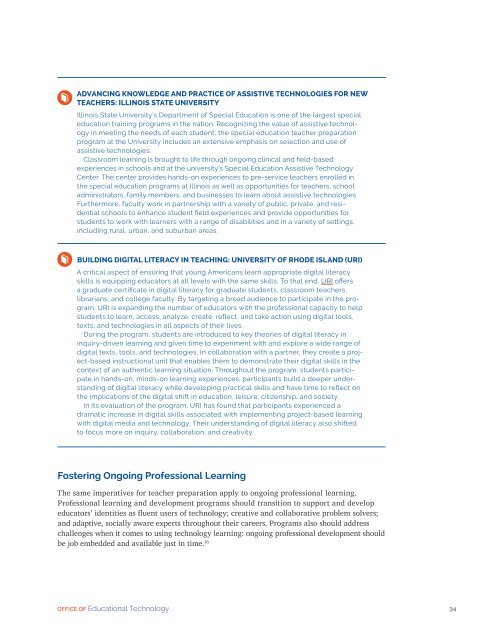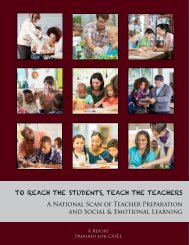Future Ready Learning
7m3sdJ
7m3sdJ
Create successful ePaper yourself
Turn your PDF publications into a flip-book with our unique Google optimized e-Paper software.
ADVANCING KNOWLEDGE AND PRACTICE OF ASSISTIVE TECHNOLOGIES FOR NEW<br />
TEACHERS: ILLINOIS STATE UNIVERSITY<br />
Illinois State University’s Department of Special Education is one of the largest special<br />
education training programs in the nation. Recognizing the value of assistive technology<br />
in meeting the needs of each student, the special education teacher preparation<br />
program at the University includes an extensive emphasis on selection and use of<br />
assistive technologies.<br />
Classroom learning is brought to life through ongoing clinical and field-based<br />
experiences in schools and at the university’s Special Education Assistive Technology<br />
Center. The center provides hands-on experiences to pre-service teachers enrolled in<br />
the special education programs at Illinois as well as opportunities for teachers, school<br />
administrators, family members, and businesses to learn about assistive technologies.<br />
Furthermore, faculty work in partnership with a variety of public, private, and residential<br />
schools to enhance student field experiences and provide opportunities for<br />
students to work with learners with a range of disabilities and in a variety of settings,<br />
including rural, urban, and suburban areas.<br />
BUILDING DIGITAL LITERACY IN TEACHING: UNIVERSITY OF RHODE ISLAND (URI)<br />
A critical aspect of ensuring that young Americans learn appropriate digital literacy<br />
skills is equipping educators at all levels with the same skills. To that end, URI offers<br />
a graduate certificate in digital literacy for graduate students, classroom teachers,<br />
librarians, and college faculty. By targeting a broad audience to participate in the program,<br />
URI is expanding the number of educators with the professional capacity to help<br />
students to learn, access, analyze, create, reflect, and take action using digital tools,<br />
texts, and technologies in all aspects of their lives.<br />
During the program, students are introduced to key theories of digital literacy in<br />
inquiry-driven learning and given time to experiment with and explore a wide range of<br />
digital texts, tools, and technologies. In collaboration with a partner, they create a project-based<br />
instructional unit that enables them to demonstrate their digital skills in the<br />
context of an authentic learning situation. Throughout the program, students participate<br />
in hands-on, minds-on learning experiences; participants build a deeper understanding<br />
of digital literacy while developing practical skills and have time to reflect on<br />
the implications of the digital shift in education, leisure, citizenship, and society.<br />
In its evaluation of the program, URI has found that participants experienced a<br />
dramatic increase in digital skills associated with implementing project-based learning<br />
with digital media and technology. Their understanding of digital literacy also shifted<br />
to focus more on inquiry, collaboration, and creativity.<br />
Fostering Ongoing Professional <strong>Learning</strong><br />
The same imperatives for teacher preparation apply to ongoing professional learning.<br />
Professional learning and development programs should transition to support and develop<br />
educators’ identities as fluent users of technology; creative and collaborative problem solvers;<br />
and adaptive, socially aware experts throughout their careers. Programs also should address<br />
challenges when it comes to using technology learning: ongoing professional development should<br />
be job embedded and available just in time. 16<br />
OFFICE OF Educational Technology<br />
34



